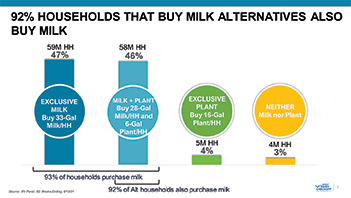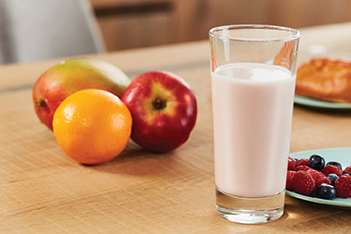 |
|||

|  |

|
|

Dairy beverages utilize ingredient trends to enhance nutrition, flavor
Editor’s note: Welcome to Ingredient Innovation, CMN’s new segment exploring recent innovations and trends in the dairy ingredients sector. For this segment, we will profile a leader in the ingredients industry as well as share updates on mergers and acquisitions and new offerings for cheese and dairy in ingredients — where flavor begins.
By Trina La Susa
|
Photo courtesy of DSM Food Specialties |
| DSM Food Specialties offers a range of patented lactase enzyme solutions as part of its portfolio. Launched in 1964, DSM’s Maxilact lactase portfolio — including Maxilact Super, Maxilact LGi and Maxilact Smart — is designed to help create clean-tasting, high-quality lactose-free and sugar-reduced fermented dairy. |
 |
| Graphic courtesy of Dairy Management Inc. |
| When it comes to beverages, 92% of households that buy milk alternatives also buy cow’s milk, with cow’s milk as the majority of their purchases. Additionally, 46% of consumers purchase both dairy milk and plant-based alternatives, according to Information Resources Inc. data from the 52 weeks ending June 13, courtesy of Dairy Management Inc. |
MADISON, Wis. — The dairy beverage landscape continues to expand and includes value-added ingredients that fit consumers’ specific needs. When it comes to dairy innovation, the goal is to connect with consumers, understand their specific desires and develop products that stay relevant with them, says Kristiana Alexander, director of knowledge and insights, Dairy Management Inc. (DMI).
“We’re seeing innovation take place across value-added dairy that’s targeting specific benefits or needs consumers are looking for, including: lactose-free, immunity, protein, energy, hydration and sugar-free,” Alexander says. “By continuing to innovate and bring in foods and ingredients that people want more of into dairy, we’ll continue to stay relevant.”
Consumers today are focused on living a holistic lifestyle, meaning one that emphasizes the connection of the mind, the body and the planet. Alexander says consumers now are more in tune to the foods and beverages they are buying, often questioning if a product is good for their body, if they will enjoy it and if they feel good about buying it.
As preferences change, dairy must innovate to meet consumer demand.
For the majority of consumers, it’s not an “either/or” when it comes to purchasing dairy or alternative food and beverages, Alexander says. On the beverage side, 92% of households that buy milk alternatives also buy cow’s milk, with cow’s milk the majority of their purchases; and 46% of consumers purchase both dairy milk and plant-based alternatives, according to Information Resources Inc. (IRI) data from the 52 weeks ending June 13, courtesy of DMI.
When it comes to hybrid beverages hitting the shelves that utilize both dairy and plant-based ingredients, Alexander says dairy delivers on all aspects of taste, nutrition and versatility, making a nutritious complement to any product. She adds that blends or hybrid beverages are all about bringing the foods and ingredients people want more of — and in this case, bringing those into dairy or having dairy go into those spaces.
“It’s about nutrition and flavor experiences when it comes to these hybrid blended products,” Alexander says, noting the nutritional benefits of dairy, like protein, can pair well with other functional ingredients like healthy grains, fruit and vegetables, matcha and turmeric.
“Beyond wanting a delicious product, consumers are looking to explore flavors in food and beverage — step out of their comfort zones or what they’re used to and try new things including global flavors and cuisines, spices, product combinations and textures. I think hybrids are a great vehicle to do that,” she adds.
Shamrock Farms, Phoenix, Arizona, this year launched Swirled, an elevated chocolate milk that blends creamy dairy and natural, plant-based ingredients. The company says the hybrid offers the “best of both worlds” with real chocolate milk, reduced sugar and healthy fats found in coconut cream and almonds.
“With Shamrock Farms Swirled, we’re putting a new twist on chocolate milk by blending sweet and creamy coconut, the richness of real almonds and fresh milk into one drink,” says Ann Ocaña, chief marketing officer, Shamrock Farms. “Swirled is a delicious, upscale take on the classic beverage and answers an unmet need of many adults who love chocolate milk but are looking for something more decadent yet still healthy. With an uncompromising flavor, it’s perfect for those who are plant-curious or plant-based but crave the benefits and taste of real milk.”
Available in two flavors, Chocolate Coconut and Chocolate Almond Coconut, Swirled blends cocoa, coconut cream and almonds with real milk from Shamrock Farms’ family of local farms. With less sugar, Swirled has a smooth texture with nine essential nutrients and is free of artificial colors, ingredients, sweeteners and growth hormones like rBST, which the company says makes it a choice that adults can feel good about.
“This innovation is a prime example of how we’re making more possible with milk,” Ocaña adds. “It’s a great tasting protein beverage delivering the energy people crave.”
Outside of beverages, Alexander says hybrid products also are entering other categories, such as The Laughing Cow Blends Cheese Spread triangles combining dairy and plant-based ingredients like chickpeas; Chobani Greek Yogurt Oatmeal on the Bottom; Peekaboo Organic Ice Cream with hidden vegetables; Premier Protein’s Clear Protein Drinks with whey protein isolate and fruit flavors; and Land O’Lakes Butter Spread with Flax, Chia and Hemp Seeds.
Also on the value-added side of dairy beverages, Alexander says digestion continues to be a hot trend, and advancements in filtration technology have helped the lactose-free segment of dairy to grow. She notes that whey protein isolates and milk protein isolates as ingredients contain very low amounts of lactose and are some of the key dairy ingredients that can aid in development of lactose-free foods and beverages.
Suppliers like DSM Food Specialties, with global headquarters in Delft, The Netherlands, and U.S. headquarters in Waukesha, Wisconsin, partner closely with customers to create customized solutions that meet their specific requirements. For producers looking to create hybrid solutions, DSM has extensive expertise in both traditional dairy and plant-based dairy and has a uniquely broad range of enzymes, cultures, hydrocolloids and nutritional ingredients that support consumer-inspired innovation.
“With our advanced formulation and applications expertise, DSM can support manufacturers and brand owners throughout the production process to create purpose-led hybrid products with the desired taste, mouthfeel and stability,” says Ben Rutten, global business manager, milk, DSM Food Specialties. “As a one-stop shop solutions provider, DSM will deliver end-to-end support to help customers get products to market quickly, from the initial planning and concept phase to implementation into the factory and out to consumers.”
Meanwhile, the popularity of the lactose-free dairy category continues its upward trajectory, with the market expected to reach $12.09 billion by 2025, according to a recent report from Research And Markets, a global market research provider.
This demand stems from several motivations, including lactose intolerance, a key factor in the popularity of these products. Growth has been further accelerated by the rising numbers of consumers — especially those aged 18-34 — turning to lactose-free solutions for their perceived health benefits, particularly those with added nutritional benefits or diverse product positioning, according to the January 2020 Future Food Trends from DSM Food Specialties. This is further supported by DSM research, which reveals that four out of 10 respondents perceive lactose-free dairy to be healthier than regular dairy.
Organic Valley, La Farge, Wisconsin, offers multiple lactose-free, digestion-friendly products including its Half Gallon White Milk in Whole, 2%, 1% and Skim varieties; 32-ounce Half & Half; and Half Gallon Chocolate Milk, according to Minh-Quan Huynh, senior brand manager. Huynh says Organic Valley achieves lactose-free milk by adding a lactase enzyme.
“The number of consumers that are lactose intolerant or lactose sensitive continues to grow amongst kids and adults, so we want to ensure that they have options to still enjoy dairy with their breakfast or snack,” Huynh says.
At the same time, health-conscious consumers are driving demand for dairy options that are lower in sugar — DSM’s research shows that 71% of consumers expect to lower their sugar intake in the next 3-5 years. While lactose free does not mean less sugar, this presents an opportunity for dairy manufacturers to differentiate their products and appeal to the rising number of consumers looking for lactose-free dairy varieties with “no added sugar” or “reduced sugar” claims, according to Rutten.
DSM offers a range of patented lactase enzyme ingredient solutions as part of its portfolio. Launched in 1964, Rutten says DSM’s Maxilact lactase portfolio — including Maxilact Super, Maxilact LGi and Maxilact Smart — is designed to help create clean-tasting, high-quality lactose-free and sugar-reduced fermented dairy.
“Maxilact Super is the latest addition to the offering and helps brands meet the needs of lactose intolerant consumers worldwide — reducing added sugar levels while also improving production efficiency and capacity to deliver healthier, tastier lactose-free products more economically,” Rutten says. “The solution is also free from invertase and arylsulfatase, which can produce unwanted off-flavors and reduce stability across shelf life.
This, paired with DSM’s expert services and in-depth market expertise, provides manufacturers with the resources needed to navigate such a dynamic market.”
The new Maxilact Super solution was designed to effectively lower the sugar levels in lactose-free dairy products by up to 20%, helping manufacturers meet the requirements for “reduced sugar” or “no added sugar” front-of-pack label claims. Rutten says the solution also unlocks the natural sweetness of fermented dairy by breaking down lactose into its sweeter monosaccharides (glucose and galactose). The solution helps achieve higher enzyme activity, meaning that producers can cut hydrolysis time by a third and achieve a double-digit increase in production efficiency while also boosting capacity without capital expenditure investment, he adds.
CMN
| CMN article search |
|
|
© 2025 Cheese Market News • Quarne Publishing, LLC • Legal Information • Online Privacy Policy • Terms and Conditions
Cheese Market News • Business/Advertising Office: P.O. Box 628254 • Middleton, WI 53562 • 608/831-6002
Cheese Market News • Editorial Office: 5315 Wall Street, Suite 100 • Madison, WI 53718 • 608/288-9090
